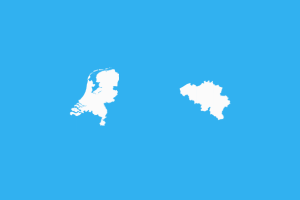The influence of the Netherlands in Belgian ecommerce

Since time immemorial, the Netherlands and Belgium have influenced each other on several fronts. They not only share the same language (although the Walloon part of Belgium speaks French, not Dutch), but also have much in common on cultural, sport and economic levels. In the ecommerce industry however, it’s mostly Dutch players who influence the Belgian industry and not the other way around.
In the Netherlands, there’s an ecommerce industry that’s full of history. Already in 1995 there was Wehkamp.nl, still one of the country’s ecommerce pioneers. And since the ending of the twentieth century there’s Bol.com, a huge player that’s not going anywhere for the coming decennia. Just like Amazon, this Dutch ecommerce giant sells products from all categories you could imagine: books, DVDs, toys, sport and leisure, garden, consumer electronics and many more. And meanwhile a pure player like Coolblue, which owns dozens of online stores, has found its way to the high street.
Ecommerce in Belgium
But when we look at the top of the Belgian ecommerce industry, it’s exactly these names we hear and see over and over again. Belgium doesn’t have a Bol.com-like, omnipresent ecommerce giant. It doesn’t have a Wehkamp with a twenty-year-old history nor a Coolblue’ish player with dozens of websites and an increasingly number of physical stores.
We’re not to say Belgium doesn’t have an own ecommerce voice, it does, but the industry is however quite heavily influenced by Dutch ecommerce players. While in the Netherlands this isn’t exactly the case. When you look at the Dutch crème de la crème, we don’t see big German or British players dominating the place. Alright, the Swedish fashion retailer H&M is quite big and so is the German online fashion player Zalando. But there’s still a distinctive ecommerce landscape noticeable in the Netherlands.
Dutch pride online
There are the aforementioned Bol.com, Wehkamp and Coolblue, but there’s also online food retailer Albert.nl (from super market chain Albert Heijn), online department store Fonq.nl (from the same owner as Wehkamp), take-away service Thuisbezorgd.nl, BAS Group (which owns electronics stores MyCom and Dixons), multi-channel department store Hema and ticket service Ticketmaster Nederland.
Some of these players are even trying it cross-border now. Thuisbezorgd.nl for example also offers its services in the BeNeLux, UK, France, Germany, Austria, Denmark and Switzerland, while Hema has opened online stores in the United Kingdom, France, Germany, Belgium and Luxemburg.
Major ecommerce players in Belgium
We can’t come up with such examples in Belgium. The country has some really major international retail players, like brewery InBev, supermarket chains Colruyt and Delhaize and biscuits and cakes selling company Lotus Bakeries. But these aren’t really active in the ecommerce industry and that’s a pity, because there are few local ecommerce players left that have a chance outside the Belgian borders.
There are still a few though, who also have a chance to succeed abroad. There’s lense company LensOnline which will open an online store in the Netherlands, there’s consumer electronics retailer Vanden Borre and there’s online media retailer ProxisAzur.be. The last two companies are active in a niche that’s already played out in neighboring countries, but LensOnline does has a good chance of succeeding in the Netherlands. And of course there’s always a change, just look at the fact that Belgian shoe retailer Torfs has opened an online store in the Netherlands, although it doesn’t even have one physical store over there.
But meanwhile Dutch players like Bol.com and Coolblue are slowly taking chunks of the ecommerce market share and major ecommerce player Wehkamp.nl just opened its Belgian online store. Why was there never a Belgian equivalent of Bol.com, a player that started with only selling books and CDs but slowly got bigger and bigger until it was one of the biggest in the country? Why doesn’t Belgium have a Wehkamp.nl, which started in the early nineties as one of the first big online stores?
To be honestly, it’s not fair to compare the Belgian ecommerce industry with that of the Dutch. The Belgian ecommerce industry started relatively late and its infrastructure, laws and regulations, the complexity of two official languages aren’t helping the ecommerce industry in Belgium either. Bol.com, Wehkamp.nl, Coolblue, Thuisbezorgd.nl and all these other Dutch players are huge, but they had the time to develop themselves since the end of the twentieth century.
Belgium is surrounded by big neighboring countries
Another thing that may play a role is the fact Belgium have big neighbors like the Netherlands, Germany and France. And the latter is a country that already has some touching points with Belgium, as the Wallonian part shares the same language with the French. The Netherlands however only have to deal with Germany and Belgium. It’s smaller than Germany, so it’s no surprise big German players like Zalando and Media Markt have entered the Dutch market. But as the Netherlands is economically bigger than Belgium, this country is the first one ecommerce players like Bol.com and Coolblue will enter.
Now the question arises how the Belgian ecommerce industry will develop. Will it still be dominated by foreign players like Bool.com, Coolblue, Amazon, Zalando and Wehkamp? Or will it finally stand on its own and will some Belgian ecommerce giant one day successfully enter the Dutch, German of French market?

Comments